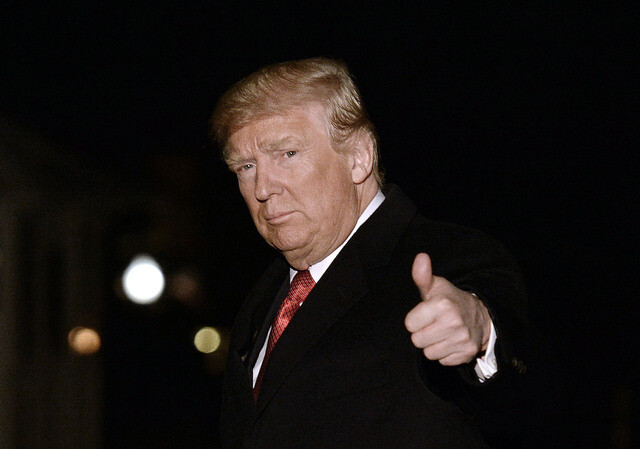hankyoreh
Links to other country sites 다른 나라 사이트 링크
US Secretary of State says Washington’s North Korea policy has failed

US Secretary of State Rex Tillerson declared Washington’s existing North Korea policy “failed” and called for a “new approach” following a meeting with the Japanese Foreign Minister in Japan on Mar. 16.
Tillerson’s visit to Japan was part of a recently launched tour of East Asia.
Tillerson’s remarks are drawing notice as the Donald Trump administration’s announcement in an official setting on the need the fundamentally revise Washington’s North Korea policy, which has been an approach of essentially not responding to North Korea’s nuclear or missile development programs in the name of “strategic patience.”
But the actual nature of the new approach remains unclear, with Tillerson declining to give specifics and stressing only the importance of trilateral efforts with South Korea and Japan to solve the nuclear issue.
The “new approach” in question could be a choice between moderation or a tough line - attempting dialogue or expressing a willingness to respond militarily. But with the Trump administration reportedly having recently ruled out either of these two extremes, Washington does not appear to have any surefire solutions in its bag.
The New York Times reported on Mar. 15 that Tillerson planned to stay in China on Mar. 18 and 19, during which time he is expected to present a “tough” position in a meeting with President Xi Jinping and other senior Chinese leaders. The prediction is that he will announce plans to set up THAAD and another missile defense system, and to apply pressure on Chinese financial institutions if Beijing does not use its influence to hold Pyongyang’s nuclear and missile programs in check.
According to the newspaper, it is a message crafted over the course of several White House meetings prior to Tillerson’s departure. It also reported that the two “extreme” options for Washington’s North Korea policy - negotiations with North Korea and military action against North Korean nuclear and missile bases - are both presently being ruled out.
Based on these media reports and accounts from sources, the Trump administration’s North Korea policy appears to be heading toward a broader framework of pressure on Beijing to use its influence on Pyongyang, intensified sanctions against North Korea, and a stronger military deterrent and defense capabilities. In this, it would be similar to the Barack Obama administration’s policies, which involved using various means of pressure to induce Pyongyang to voluntarily give up its nuclear capabilities and come to the table for negotiation.
Some have called for a “first things first” short-term approach to denuclearization with talks to freeze the North’s nuclear program. But acting State Department spokesperson Mark Toner has echoed the position that such negotiation is out of the question unless Pyongyang gives a genuine signal that it is giving up its nuclear capabilities. Despite Tillerson’s claims to the contrary, the lack of available options leaves the Trump administration’s North Korea policy ultimately shaping up into something similar to Obama’s so-called “strategic patience.”
Additionally, the possibility of a “secondary boycott,” or the imposing of sanctions even on Chinese banks and other institutions involved in normal transactions with North Korea, has also reportedly been discussed at White House meetings. But former US Treasury Department Assistant Secretary for Terrorist Financing Daniel Glaser told the New York Times that it would be difficult to implement, noting that China’s large banks typically avoid dealing with North Korea while its smaller ones have “little exposure” to the US banking system.
It is also unclear just how tough a message Tillerson will communicate to the Chinese leadership from the White House. Too much raising of tensions could create a burden for Washington and Beijing both as they prepare for a bilateral summit at the Mar-a-Lago resort in Florida early next month.
By Yi Yong-in, Tokyo correspondent
Please direct questions or comments to [english@hani.co.kr]

Editorial・opinion
![[Column] Has Korea, too, crossed the Rubicon on China? [Column] Has Korea, too, crossed the Rubicon on China?](https://flexible.img.hani.co.kr/flexible/normal/500/300/imgdb/original/2024/0419/9317135153409185.jpg) [Column] Has Korea, too, crossed the Rubicon on China?
[Column] Has Korea, too, crossed the Rubicon on China?![[Correspondent’s column] In Japan’s alliance with US, echoes of its past alliances with UK [Correspondent’s column] In Japan’s alliance with US, echoes of its past alliances with UK](https://flexible.img.hani.co.kr/flexible/normal/500/300/imgdb/original/2024/0419/2317135166563519.jpg) [Correspondent’s column] In Japan’s alliance with US, echoes of its past alliances with UK
[Correspondent’s column] In Japan’s alliance with US, echoes of its past alliances with UK- [Editorial] Does Yoon think the Korean public is wrong?
- [Editorial] As it bolsters its alliance with US, Japan must be accountable for past
- [Guest essay] Amending the Constitution is Yoon’s key to leaving office in public’s good graces
- [Editorial] 10 years on, lessons of Sewol tragedy must never be forgotten
- [Column] A death blow to Korea’s prosecutor politics
- [Correspondent’s column] The US and the end of Japanese pacifism
- [Guest essay] How Korea turned its trainee doctors into monsters
- [Guest essay] As someone who helped forge Seoul-Moscow ties, their status today troubles me
Most viewed articles
- 1[Column] The clock is ticking for Korea’s first lady
- 2Hong Se-hwa, voice for tolerance whose memoir of exile touched a chord, dies at 76
- 3[Column] Has Korea, too, crossed the Rubicon on China?
- 4After 2 months of delayed, denied medical care, Koreans worry worst may be yet to come
- 5[Correspondent’s column] In Japan’s alliance with US, echoes of its past alliances with UK
- 6All eyes on Xiaomi after it pulls off EV that Apple couldn’t
- 7[Photo] Smile ambassador, you’re on camera
- 8US overtakes China as Korea’s top export market, prompting trade sanction jitters
- 9S. Korea “monitoring developments” after report of secret Chinese police station in Seoul
- 1075% of younger S. Koreans want to leave country